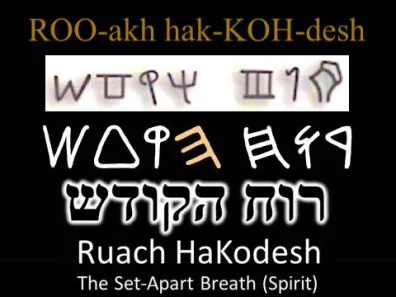

Holy Spirit - Ruach haKodesh (הקודש רוּחַ):
The Hebrew word "ruach" (רוח) is grammatically feminine, meaning that it takes feminine pronouns and adjectives in Hebrew grammar. However, this grammatical gender does not imply a literal female identity or connotation.
The Hebrew word "ruach" (רוּחַ) has a range of meanings, including:
• Breath: "Ruach" is often used to refer to the breath of life, the vital force that animates living beings. It is seen as the manifestation of the divine spirit within creation.
• Wind: "Ruach" can also refer to the wind, a powerful and unpredictable force of nature. It is often used metaphorically to represent the power and presence of God in the world.
• Spirit: In a more abstract sense, "ruach" can refer to the spirit or essence of a person or thing. It can represent one's emotions, intellect, or willpower.
• Spirituality: In a religious context, "ruach" is often used to refer to the Holy Spirit, the third person of the Trinity in Christianity and a manifestation of God's presence in Judaism.
In Hebrew, many nouns that refer to abstract concepts or natural phenomena are grammatically feminine. For example, the words for "wisdom" (חוכמה), "torah" (תורה), and "soul" (נפש) are also feminine. This grammatical gender does not mean that these concepts are literally female, but rather reflects a linguistic convention.
Similarly, the feminine gender of "ruach" does not necessarily imply that the Holy Spirit is a female being. In both Judaism and Christianity, the Holy Spirit is not considered to have a gender in the same way that humans do. Rather, the feminine grammatical gender of "ruach" may reflect its association with divine power, creativity, and nurturing, qualities that have traditionally been associated with the feminine in various cultures.
The Hebrew phrase "Ruach Hakodesh" (רוּחַ הַקֹּדֶשׁ) means "Holy Spirit" in English. It is a term used in both Judaism and Christianity to refer to the divine spirit or force of God. The word "Ruach" (רוּחַ) means "spirit" or "wind," while the word "Kodesh" (קֹדֶשׁ) means "holy" or "set apart."
In Judaism, Ruach Hakodesh is seen as the creative and sustaining power of God. It is also associated with prophecy, revelation, and inspiration. In the Hebrew Bible, Ruach Hakodesh is mentioned in connection with the creation of the world (Genesis 1:2), the anointing of prophets (1 Shemu’ĕl 10:10), and the filling of the Tabernacle with God's presence (Exodus 40:34).

| 